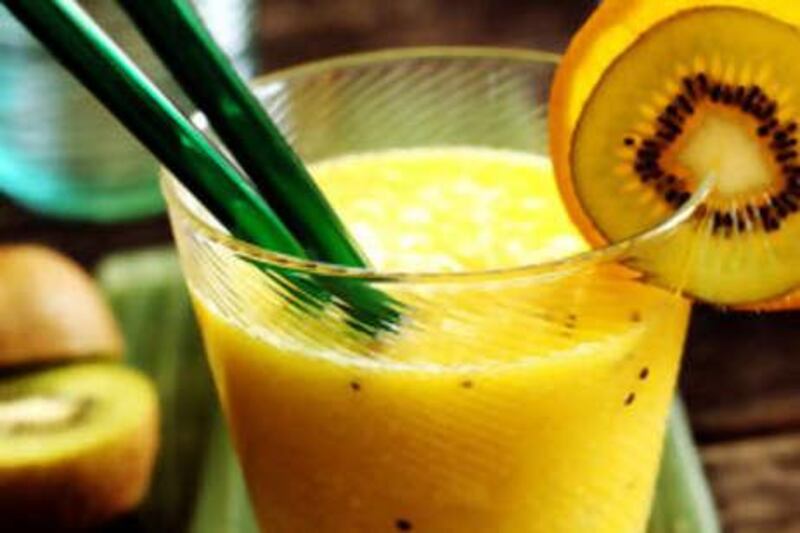When it comes to fresh and bottled fruit juice, the UAE has plenty to choose from. With a wide variety of bottled juice lining grocery store shelves and no shortage of refreshment stands offering mouthwatering, freshly squeezed combinations, it is easy to make fruit juice part of your daily diet. But how good for you is it? And can it replace whole fruit in a healthy diet? The answer may surprise you. Fruit is full of essential nutrients, such a potassium, magnesium and vitamins A and C. It's also low in fat and high in fibre. In fact, it is recommended that adults get between seven and 10 servings of fruit and vegetables daily.
For many people, sipping their servings of fruit through a straw is a convenient and easy alternative to eating whole fruit. But while pure juice can be part of a well-rounded diet, it may shock you to learn what is lurking in some seemingly "healthy" fruit drinks. Whole fruit has more than a few benefits over its liquid counterpart. First of all, a whole piece of fruit is more filling calorie for calorie. For instance, eating an apple can take the edge off when you're famished. It will also offer about 72 calories (14 grams of naturally occurring sugars) and 3g of fibre. A 500ml bottle of unsweetened apple juice on the other hand has a whopping 238 calories (56g of sugar), less than 1g of fibre and is nowhere near as satisfying.
Secondly, fruit juice is often much more than just that. Despite their natural sweetness, many juices (bottled and freshly squeezed) contain added sugar. A trip to a local refreshment stand revealed that a large juice (500ml) had upwards of three to four tablespoons of added sugar. And bottled juice from the supermarket is little better. Most have added sugar. Fruit juice is a calorie and sugar-rich beverage that should be consumed in moderation. In fact, most health organisations recommend that diabetics cut fruit juice altogether because it can cause a rapid spike in blood glucose levels.
When it comes to drinking fruit juice, there are a few things to remember. First of all, pure fruit juice is the only way to go. Anything labelled "drink", "punch" or "cocktail" can have as little as 10 per cent of actual fruit juice. These drinks tend to be mostly water and added sugar. And don't be fooled by labels that read "real fruit beverage". This is jargon for nothing more than sugar-laden flavoured water. A peek at the ingredient list for any of these juice impostors reveals they're loaded with additives.
Look for products labelled 100 per cent pure, unsweetened fruit juice to ensure you're getting the healthiest product. A quick scan of the ingredients list is a sure-fire way to weed out anything with added sugar and water. If you are buying freshly squeezed juice from a refreshment stand, order it without added sugar. Pure fruit juice can be part of a healthy diet as long as portions remain in check. A good serving of juice is only half a cup (125 ml). This is much less than most people drink in one sitting. An average bottle, or a large freshly squeezed juice from a refreshment stand is four times larger than a healthy serving.
On another note, there are some dangers to juice consumption - especially grapefruit juice. New research has shown that grapefruit juice can interact with medications and prevent them from being digested in the right way. As a result too much medication gets into the blood. This can have serious side effects. Medications that have been affected by as little as one glass of grapefruit juice per day include some cholesterol-lowering drugs and antidepressants. If you drink grapefruit juice often, be sure to talk with your doctor or pharmacist to ensure none of your medications will be affected.
If you find you're having more fruit juice than whole fruit, cut back and add whole fruit to your diet. You will get the same nutrients with fewer calories, and more fibre. You can also replace juice with calorie-free, no-sugar beverages including iced water with freshly squeezed lemon and tea steeped in cold water.






